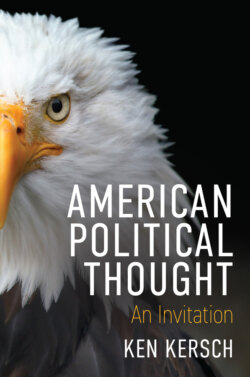Читать книгу American Political Thought - Ken Kersch - Страница 18
Questions
Оглавление1 Is there a substantive content to “American” political thought as a distinctive subject of study (as opposed, for instance, to the study of political theory, intellectual history, or even the study of American politics more generally)? If so, in what sense?
2 Is it possible to construct a canon of American political thought? If so, what are the standards enlisted to determine selection for inclusion in, or exclusion from, the canon?
3 In studying American political thought, how accurate or helpful is it to talk about core, shared understandings of concepts like “liberty,” “equality,” “democracy,” or “justice”?
4 How might we think about the political thought of particular individuals across the temporal span of their lives and experiences? Does it make sense to speak of the political thought of, for instance, James Madison, Abraham Lincoln, Martin Luther King Jr., Malcolm X, or Ronald Reagan as if they had a stable philosophy that extended across the entirety of their lives?
5 How useful, or dangerous, is it to posit an “American exceptionalism”?
6 What is gained or lost in positing either a hegemony or a (delimited) pluralism of overarching ideologies or frameworks to understand American political thought? Relatedly, does it ever make sense to enlist the category of “we” in our discussions of American political thought?
7 Do you think political philosophies or ethically constitutive stories have been more influential in shaping the contours of American political thought? How and in what ways?
8 How much of the American political thought tradition has been determined by broad, impersonal social forces (geography, demography, economics, ideology), and how much by individual agency?
9 In studying American political thought, how useful, or dangerous, is it to avail ourselves of apparently hermetic categories – often in the form of binaries – to get an analytic grip on the politics of a moment (e.g. founders v. loyalists; liberal v. republican; Federalists v. Antifederalists; the people v. the interests (or elites); progressives/liberals v. conservatives)?
10 What role does time (chronology/development) play in American political thought? Is there a consistency to ideational frameworks across time? Or do things change over time in critical ways? Relatedly, how might we think about the forces driving chronological patterns? How is the influence of ideas, ideologies, and frameworks temperally reproduced or institutionalized or, for that matter, interrupted and de-institutionalized?
11 How much of the study of American political thought should be about what is (in a positivist sense), and how much should be about what ought to be (in a normative sense)?
12 Are progressives/liberals and conservatives likely to study American political thought in different ways? Americans and non-Americans? Members of historically powerful and historically marginalized groups?
13 Is the American political thought tradition one of which Americans should be proud, ashamed, or something in between? Why?
